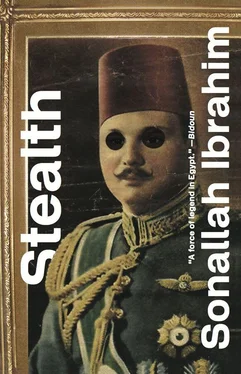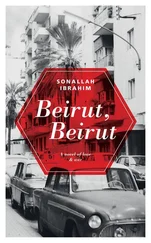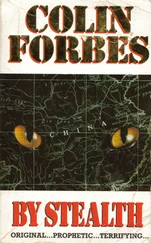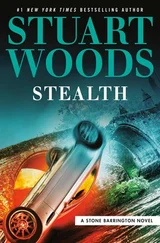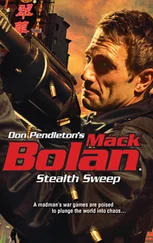I notice a bedbug coming toward my head. I don’t want to move, so father won’t see that I’m awake. I know it’s going to bite me once the lights are out and keep me from sleeping. I follow it with my eyes to see where it will hide.
“Finally, Um Nabila died. We had done with all the mourning, and Nabila says: ‘Come on, Papa, stay with me.’ I told her I was married and had a second house. She was angry and her brother went crazy and told me: ‘Now you’re going to mate like rabbits and have lots of little ones, aren’t you?’ But I went ahead and settled in the new house, and I had a taste of what it was like to be happy.”
He was quiet. He lit a cigarette again. “When I had Nabila and her brother, I was still a young man and I spent most of my time outside the house. This time I really enjoyed being a father. Especially after I retired.” He turned towards me and I closed my eyes. “I’ll never forget the sight of him coming into the room, opening up the drawers, and rifling through the books. Whenever he saw something new, he would point to it and say: ‘That?’ Then it became: ‘What’s that?’ He would try to show me that he understood. I won’t forget the sight of him the first time he ever stood up. He wobbled two steps toward me and clapped. He felt he had achieved something great.”
I drift off then wake up to the buzzing of a mosquito next to my ear. I call upon God to keep it from biting me. The voice of Ali Safa: “I’ll go crazy. At night I toss and turn, wanting a soft body in my embrace. We wouldn’t even have to do anything.”
Father says: “So what are you going to do, my friend? Your only option is to stare.”
“You said it. When I was coming over I saw a girl running in the street. Her tits were bouncing around. I thought I could hear the sound of her buttocks bouncing against each other. Now everything reminds me of what used to be. A shawl wrapped snugly around a tight ass. Two lips slipping through the covering of a burka. A plump arm in short sleeves or a bare shoulder under a sleeveless blouse.”
Quiet settles over them both. The radio plays in the constable’s room. Fareed al-Atrash. I notice the bedbug scooting across the wall. It wants to get away from the light. I reach out my finger and crush it, then I hold my breath, so I won’t have to smell its stink.
Father’s voice: “It was the first month that I went to get my pension. There was an old man wearing a checkered coat, a dark-colored shirt, and a tattered necktie. The edge of his fez had a sweat stain. He was leaning on a cane. He wore Coke-bottle glasses. You had no idea where he was looking. When his turn came, he didn’t move. He kept standing quietly as though he was daydreaming and he was ready to just wait there until the next day. The clerk at the cashier’s window knew me. He made my payments. He stretched out his hand to get my claim certificate. I got up and waved at the old man to go ahead of me. He said something I couldn’t hear. The clerk motioned him over to the next window. He started to move with a great effort, so I helped him make it to the next window. Not only did he not thank me, he didn’t even look at me. It was like I wasn’t there. When I went out, I saw him standing there, leaning against a lamp post. He kept standing there for a long time, looking straight ahead. It was like he had forgotten where he was. I couldn’t go near him. Give me another two or three years and I’ll be just like him.”
Ali Safa says: “Don’t even think that way, friend. It’s still too soon for that.” I feel father shaking his head. “I’ve started to trip when I’m walking along. My eyes glaze over. I don’t hear well. My molars hurt, but when I go to the dentist, he says my gums are shrinking.” Safa says: “The important thing is your virility.” Father’s voice comes to me as though he is far away: “What virility? It’s just a couple of drops now. The old power hose isn’t there anymore.”
The older students in the back rows stand up. Shouting in the courtyard. We pick up our satchels and leave the classroom. We join the students from the other classes. Everyone’s chanting: “Today, today, for study no way!” We gather in the school playground. The principal is standing by the closed school door. Sounds of a demonstration come from outside. Bricks rain down on the door of the school. The principal pulls back and the doorman opens the front door. We push out into the street and join with the students from the schools around us. The demonstration shoots out in the direction of the main street. We repeat after the students riding on the shoulders of classmates: “God is supreme; to Him be the glory.” “Long live the common struggle of the peoples of the Nile Valley.” “No to foreign occupation.” “Nahas Pasha, leader of the people.” The police are waiting for us at the end of the street. They block the way with a row of mounted officers. They move towards us and we run.
I escape to a side street. I stop in front of a newspaper stand. Pictures of actresses on the covers of magazines, like al-Kawakib, al-Athnain , and Mesaamarat al-Geeb . I pick up one with a picture of Tarzan on it. The salesman scolds me and grabs it out of my hands. I buy a notebook of songs for five millimes then keep walking. Stumping my foot in the dirt, I notice a round piece of iron. I back away from it. I make a point of going around the shop of the sheikh of the quarter. Finally, I come to the house. I ring the bell but father doesn’t answer. I ring again and Mrs. Tahiya opens up. She says: “Your father’s gone out. Close the door behind you.” She leaves me alone and heads for the kitchen. I close the door to the apartment. I push on the door to our room and find it’s locked. I have the key. I go in and put my satchel on the desk. Take off my clothes and put on the pyjamas with the shiny buttons. I go back to the door. Stand at the threshold listening. I come out into the living area.
The sound of the primus stove is coming from the kitchen. I take light steps out toward the hallway. I avoid looking in the direction of the toilet. I come close to the door of the kitchen. Cling to the wall. My head leans out with care. She’s sitting on the little kitchen stool and peeling cloves of garlic. There’s a plate of ful beans next to her. I take a step back towards the living room. I go around the table to the door to her room. It’s open. I go closer. On top of the bed, there’s a blue patterned dress and on the floor are white shoes with high heels. On the wall a big picture hangs in a gilded frame. In it, the constable wears a military uniform. He’s smiling. He has a high fez on and it is leaning to the left. A chiffonier to the right has a big mirror over it in a pale-colored metal frame. The mirror is sitting on the top of the chiffonier. It has a crack at the top of the glass. On top of the chiffonier many things are scattered including a box of chocolates. Would she notice if I took one? I prick up my ears. She’s singing in the kitchen: “the day we met, we two. .” Her voice comes closer.
I back away from the door to the room. Stop next to the door to the skylight. I can look down into the window of Um Zakiya. It is closed and darkened. She comes into the living room. A cup of tea is in her hand. She heads towards her room, and waves at me to follow her. She sets the cup down on top of the chiffonier. She opens the box of chocolates and takes out a piece wrapped in shiny gold foil. She hands it to me. She asks about my mother. My face goes red. I don’t answer. She’s sitting in a chair in the middle of the living room and her thick hair is hanging down over her shoulders. She’s crying: “Ahhh! My head!” Her face looks like she is in pain. My father gives her a piece of ice. She puts it on her head and presses it.
Читать дальше
